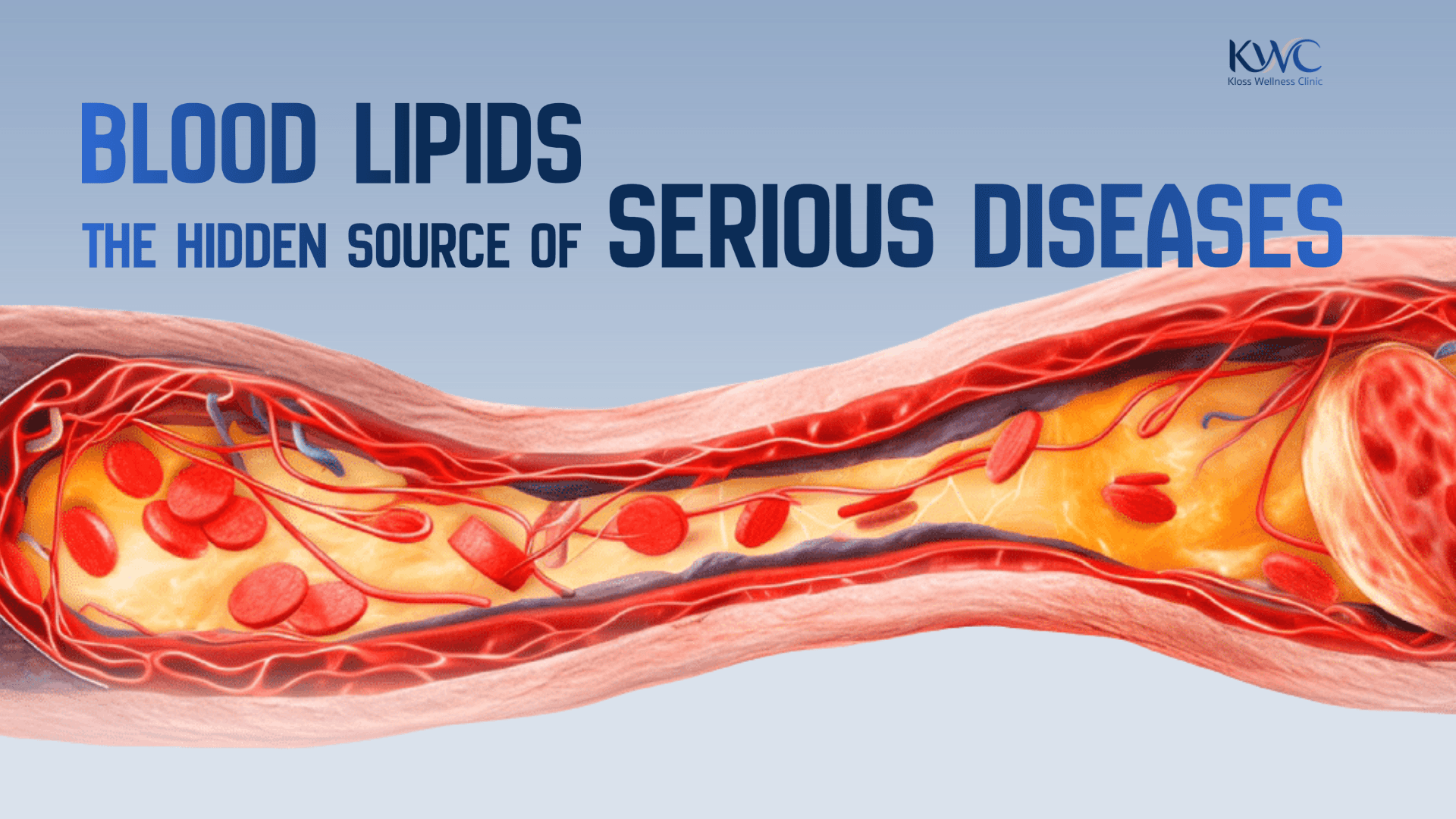Blood Lipids: The Hidden Source of Serious Diseases

High blood lipids refer to an excessive level of fats circulating in the bloodstream. These fats include several types, particularly cholesterol and triglycerides, which when elevated, can pose significant health risks.
Common Causes of High Blood Lipids
1. Diet: Consuming foods high in saturated fats or trans fats can significantly increase lipid levels.
2. Genetics: Some individuals have a hereditary predisposition to elevated blood lipids.
3. Sedentary lifestyle: Lack of physical activity affects fat metabolism and promotes fat accumulation in the body.
4. Underlying medical conditions: Such as diabetes, hypertension, and kidney disease.
5. Certain medications: Birth control pills and some antihypertensive drugs may increase blood lipid levels.
Why Is Blood Lipid Cleansing Important?
Managing or “cleansing” blood lipids is essential because excessively high lipid levels can severely impact your health. Without proper control, they can damage the cardiovascular system and other organs.
Key Complications of High Blood Lipids
1. Coronary artery disease: Fat buildup forms plaques along the coronary artery walls.
2. Stroke: Plaque accumulation in vessels supplying the brain may cause blockage or rupture.
3. Atherosclerosis: Fat deposits cause arteries to harden and lose elasticity.
4. Hypertension: Narrowed vessels force the heart to work harder, raising blood pressure.
5. Pancreatitis: Extremely high triglycerides can trigger inflammation of the pancreas.
6. Metabolic syndrome: A combination of high lipids, hypertension, and elevated blood sugar.
Blood Lipid Cleansing with Kloss Wellness
For those who have tried diet control, lifestyle changes, and exercise but still see no improvement, Kloss Wellness recommends a supportive treatment:
Phospholipid Treatment (Plaque X)
Also known as Essential Phospholipid Therapy (EPL-PP) or arterial cleansing with essential fatty acids.
This treatment helps remove calcium deposits and fatty plaques adhering to the artery walls—particularly the hardened plaques associated with cardiovascular diseases.
What Is Phospholipid Treatment (Plaque X)?
A therapy using plant-derived essential phospholipids to help rebalance lipid levels and reduce fat accumulation along the arterial walls.
It not only decreases LDL (bad cholesterol) but also increases HDL (good cholesterol).
Additionally, it assists in improving fat metabolism, reducing fatty liver, and supporting healthier skin.
Administration:
Delivered via IV infusion, each session lasts 60–90 minutes, with dosage tailored to the patient’s condition. It is considered safe and effective.
Benefits of Phospholipid Treatment
● Helps remove fatty plaques from blood vessel walls, reducing the risk of arterial narrowing and hardening
● Lowers LDL cholesterol and raises HDL cholesterol
● Improves symptoms of coronary artery disease, reduces chest pain, and helps prevent stroke
● Enhances blood circulation and boosts fat metabolism
Who Is Suitable for Phospholipid Treatment?
● Individuals with high blood lipids
(Hyperlipoproteinaemia, Hypercholesterolaemia, Hypertriglyceridaemia)
● Patients with atherosclerosis (hardened arteries)
● Those with coronary artery atherosclerosis
● Individuals experiencing chest pain (angina pectoris)
● Patients recovering from myocardial infarction
● Individuals with impaired cerebral or peripheral circulation
● Those experiencing leg pain while walking (intermittent claudication)
● Patients with vascular diseases, especially those with diabetes
● Individuals requiring pre-surgical treatment to prevent thromboembolism
● Patients with liver disease
Maintaining a healthy lifestyle is crucial. Anyone can be at risk of developing high blood lipids if they neglect proper self-care. Imbalanced and unhealthy routines significantly increase the chance of lipid disorders.
If you’re ready to take control of your health, Kloss Wellness Clinic is here to help.
Book a Health Consultation
Available at all Kloss Wellness Clinic branches:
Serithai Branch: 099-265-2495
Muang Thong Thani Branch: 099-246-3691
Bangna Branch: 095-636-2326
LINE ID: @klosswellness
Source: www.klosswellnessclinic.com
**Translated and compiled by ArokaGO Content Team
Kloss Wellness Clinic
Share this article
More Articles
Discover more insights on health care and medical tourism.

Best Ways To Prevent Contact Lens Infections?
The most important thing in contact lens care is cleanliness which is not only the contact lens but also a contact lens storage case. Here are two important steps to contact lens care.

EBOO Therapy in the 21st Century: Restoring Health in a Toxic World
EBOO (Extracorporeal Blood Oxygenation and Ozonation) is a medical innovation that uses a blood filtration system combined with oxygen and ozone infusion. This process removes toxins, heavy metals and harmful by-products from the bloodstream while simultaneously increasing oxygen levels, improving circulation and supporting vital organ function.

Is cycling really effective in treating osteoarthritis of the knee? Discover the techniques for strengthening your knees through cycling without surgery.
For those experiencing knee pain or suffering from osteoarthritis, physical movement can often be daunting. Many choose to stop moving for fear of further knee damage, but in reality, inactivity leads to muscle atrophy and knee stiffness. One of the most commonly recommended methods by doctors and physical therapists worldwide is cycling to treat osteoarthritis. But the question is, how can one cycle effectively for rehabilitation without worsening the joint condition? This article provides the answer.